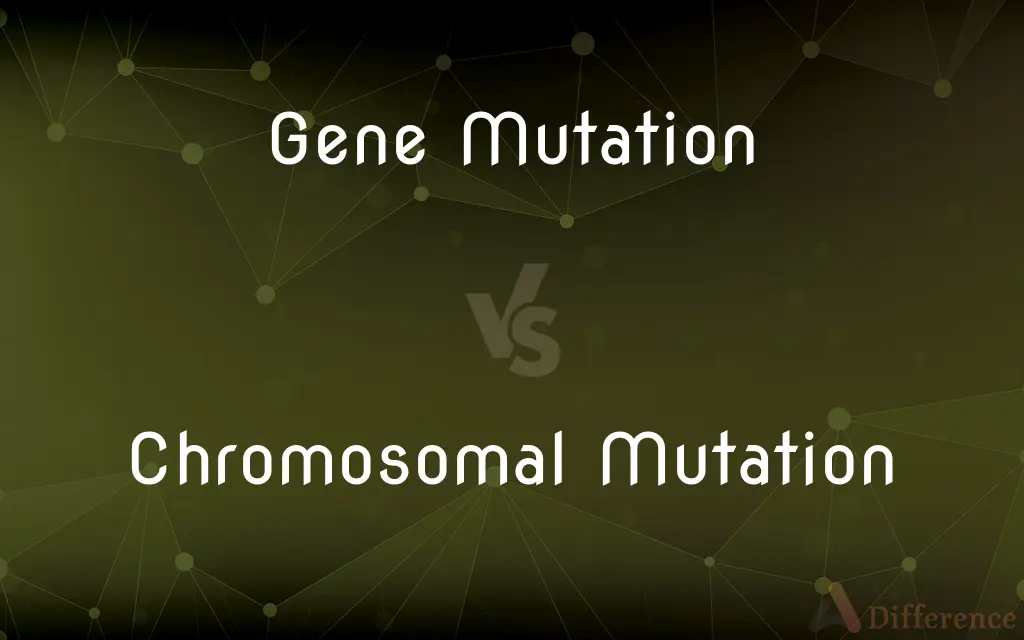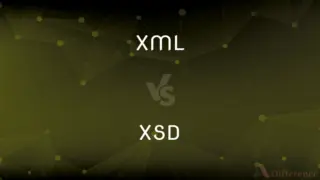Gene Mutation vs. Chromosomal Mutation — What's the Difference?
By Tayyaba Rehman — Published on November 16, 2023
Gene Mutation involves changes in individual genes. Chromosomal Mutation involves changes in the structure or number of entire chromosomes.

Difference Between Gene Mutation and Chromosomal Mutation
Table of Contents
ADVERTISEMENT
Key Differences
Gene Mutation refers to alterations that take place within a single gene or a segment of DNA. When there's a change in the nucleotide sequence of that gene, it can affect how the gene functions or is expressed. On the other hand, Chromosomal Mutation is about changes that happen at a larger scale, impacting the entire chromosome or a significant part of it. Such mutations can lead to alterations in the number of chromosomes or their structure.
Within the realm of Gene Mutation, you might encounter point mutations, where a single nucleotide base is substituted, added, or deleted. This can lead to conditions like sickle cell anemia. In contrast, Chromosomal Mutation can manifest as deletions, duplications, inversions, and translocations of large DNA segments. Down syndrome, caused by an extra 21st chromosome, is a result of this type of mutation.
Gene Mutation can sometimes be harmless, as the change might not affect the function of the protein for which the gene codes. But in cases where it does, it might result in diseases or disorders at a molecular level. Conversely, Chromosomal Mutation often has profound effects as they can influence several genes located on the chromosome, leading to more significant developmental or physiological disturbances in the organism.
It's crucial to understand that while all genes reside on chromosomes, not all mutations impact the entire chromosome. A Gene Mutation is like a typo in a single word of a book, while a Chromosomal Mutation is akin to rearranging, adding, or deleting entire pages or chapters from that book.
Comparison Chart
Scale
Single gene or DNA segment
Entire chromosome or large segment
ADVERTISEMENT
Types of Changes
Substitution, addition, or deletion of nucleotides
Deletions, duplications, inversions, translocations
Resultant Conditions
Sickle cell anemia, some cancers
Down syndrome, Turner syndrome
Impact
Can be mild or significant
Often profound and extensive
Analogy
Typo in a word
Rearranging, adding, or deleting pages in a book
Compare with Definitions
Gene Mutation
Alteration in the DNA sequence within a gene.
Through gene sequencing, the doctor identified a gene mutation linked to the patient's disease.
Chromosomal Mutation
A change in the structure or number of chromosomes.
Chromosomal mutations can result in genetic disorders like Down syndrome.
Gene Mutation
A deviation from the normal sequence of a gene.
Gene mutations can be inherited or acquired during one's lifetime.
Chromosomal Mutation
A significant genetic change involving entire chromosomes.
During meiosis, chromosomal mutations can occur, leading to gametes with missing or extra chromosomes.
Gene Mutation
Modification in the coding sequence of a single gene.
Research has shown that certain cancers are associated with gene mutations.
Chromosomal Mutation
Large-scale genetic modifications impacting multiple genes.
Chromosomal mutations can lead to developmental or physiological disturbances.
Gene Mutation
A change in the nucleotide sequence of a gene.
A specific gene mutation causes cystic fibrosis.
Chromosomal Mutation
Alteration affecting whole chromosomes or large segments.
Some birth defects are attributed to chromosomal mutations.
Gene Mutation
Aberration at the molecular level in a gene's sequence.
Scientists are exploring therapies targeting specific gene mutations.
Chromosomal Mutation
Deviations in the normal chromosomal structure or count.
Genetic counseling can help detect chromosomal mutations in unborn babies.
Common Curiosities
What's the primary difference between a Gene Mutation and a Chromosomal Mutation?
Gene Mutation affects individual genes, while Chromosomal Mutation affects whole chromosomes or large segments.
Is sickle cell anemia a result of Gene Mutation or Chromosomal Mutation?
It's a result of a Gene Mutation.
Can Gene Mutations be beneficial?
Yes, some gene mutations offer advantages and contribute to evolution.
What causes Chromosomal Mutations?
They can arise from errors during cell division or exposure to radiation and certain chemicals.
Which mutation type is more common: Gene Mutation or Chromosomal Mutation?
Gene Mutations are more common since they occur at a smaller scale.
What is a deletion in terms of Chromosomal Mutation?
It's when a segment of a chromosome is removed or lost.
Can environmental factors cause Gene Mutations?
Yes, radiation, chemicals, and other factors can induce gene mutations.
Are Chromosomal Mutations always harmful?
No, but they often lead to more significant developmental or physiological disturbances.
Can Chromosomal Mutations be inherited?
Yes, some chromosomal mutations can be passed from parents to offspring.
Can Chromosomal Mutations lead to miscarriages?
Yes, severe chromosomal mutations can result in nonviable pregnancies.
How is a Gene Mutation identified?
Through gene sequencing and other molecular techniques.
Can we correct Gene Mutations?
Some gene therapies aim to fix or counteract gene mutations, but they are still in developmental stages for many conditions.
How do Gene Mutations contribute to evolution?
They introduce genetic variability, which can lead to new traits and adaptations.
Do all Gene Mutations lead to diseases?
No, many gene mutations are harmless or even beneficial.
Is Down syndrome a result of Gene Mutation or Chromosomal Mutation?
It's a result of a Chromosomal Mutation, specifically trisomy of chromosome 21.
Share Your Discovery

Previous Comparison
Active Calories vs. Total Calories
Next Comparison
XML vs. XSDAuthor Spotlight
Written by
Tayyaba RehmanTayyaba Rehman is a distinguished writer, currently serving as a primary contributor to askdifference.com. As a researcher in semantics and etymology, Tayyaba's passion for the complexity of languages and their distinctions has found a perfect home on the platform. Tayyaba delves into the intricacies of language, distinguishing between commonly confused words and phrases, thereby providing clarity for readers worldwide.
















































